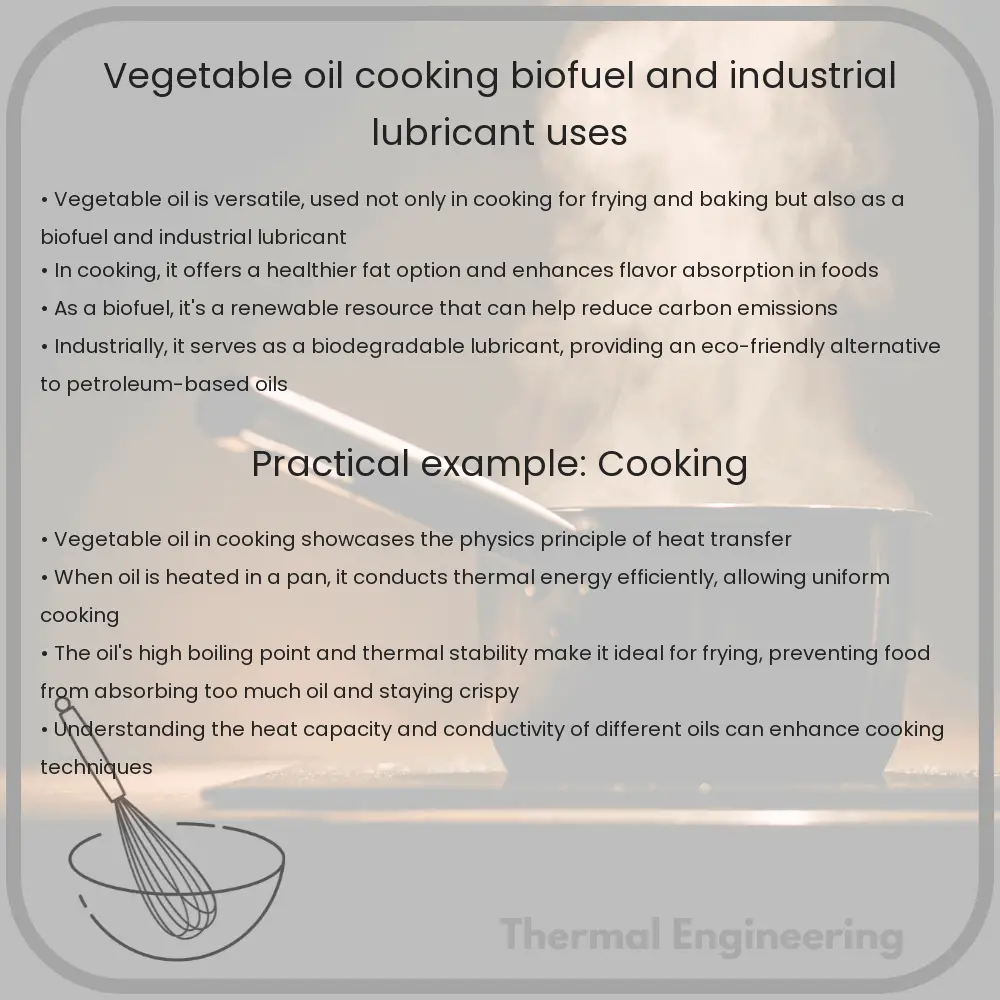Uncover the diverse applications of vegetable oils in cooking, biofuel production, and industrial uses.

Vegetable Oil: The Versatile Miracle
Vegetable oils are liquids extracted from various seeds, fruits, nuts, and beans by mechanical pressing or solvent extraction. Common sources include soybeans, sunflowers, olives, coconuts, and canola. These oils are not only a staple in kitchens worldwide but also play crucial roles in biofuel production and industrial applications. Let’s explore the multifaceted uses of vegetable oils across different sectors.
Cooking and Food Production
In culinary contexts, vegetable oils are prized for their ability to conduct heat and enhance flavor. They are used in a variety of cooking methods, including frying, sautéing, and baking. Each type of oil offers distinct flavors and smoking points—the temperature at which the oil begins to smoke and degrade—making some oils better suited for certain cooking techniques than others. For example, olive oil is commonly used for salad dressings and low-heat cooking, while canola oil is often preferred for its neutral flavor and high smoking point, ideal for frying.
- Health Aspect: Many vegetable oils are rich in essential fatty acids, such as omega-3 and omega-6, and provide a source of fat-soluble vitamins like Vitamin E.
- Economic Impact: The global edible oil market is a massive economic industry, influenced by factors such as crop yield, global trading policies, and dietary trends.
As a Biofuel
With the increasing need for sustainable energy sources, vegetable oils have gained attention for their potential as biofuels, primarily as biodiesel. Biodiesel is produced through a process known as transesterification, where oils are reacted with an alcohol (usually methanol) and a catalyst to form fatty acid methyl esters (FAME).
The equation for this chemical reaction can be represented as:
R-COOR’ + CH3OH → R-COOCH3 + R’OH
Where R-COOH represents the fatty acid and R’OH is the alcohol produced.
- Environmental Benefits: Biodiesel burns cleaner than petroleum diesel, reducing particulate matter, carbon monoxide, and unburned hydrocarbons in exhaust emissions.
- Usage: It can be used in existing diesel engines with little to no modification, making it a practical and renewable alternative to fossil fuels.
Industrial Lubricant Uses
Vegetable oils are also valuable as lubricants in various industrial applications. Their lubricity and higher flash points make them suitable for high-temperature environments. The natural biodegradability of vegetable oils offers significant environmental benefits, such as reduced toxicity and easier disposal compared to synthetic lubricants.
- Metalworking Fluids: Used extensively in machining and metal forming processes, vegetable-based oils help in reducing friction and wear, enhancing tool life and surface finish.
- Hydraulic Fluids: Certain vegetable oils, especially those with good oxidative stability and low-temperature properties, are used as hydraulic fluids in environmentally sensitive areas, such as forestry and agriculture.
While vegetable oils continue to play a pivotal role in multiple industrial domains, ongoing research focuses on improving their oxidative stability and low-temperature characteristics to widen their applicability and efficiency.
In conclusion, vegetable oils represent a remarkable example of versatility in both daily life and industrial settings. From frying a pan of eggs to powering a city bus or lubricating a wind turbine, they demonstrate the incredible adaptability and potential of nature’s resources.